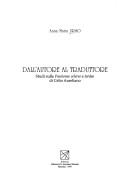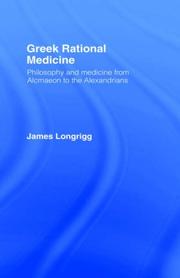| Listing 1 - 10 of 200 | << page >> |
Sort by
|
Book
ISBN: 9783110201253 Year: 2009 Volume: 258 Publisher: Berlin de Gruyter
Abstract | Keywords | Export | Availability | Bookmark
 Loading...
Loading...Choose an application
- Reference Manager
- EndNote
- RefWorks (Direct export to RefWorks)
Medicine, Greek and Roman --- Greek medicine --- Medicine, Roman --- Medicine, Unani --- Roman medicine --- Tibb (Medicine) --- Unani medicine --- Unani-Tibb (Medicine) --- Medicine, Ancient --- Hippocrates.
Book
ISBN: 9782701015149 Year: 2007 Publisher: Paris Beauchesne
Abstract | Keywords | Export | Availability | Bookmark
 Loading...
Loading...Choose an application
- Reference Manager
- EndNote
- RefWorks (Direct export to RefWorks)
Medicine, Greek and Roman --- Greek medicine --- Medicine, Roman --- Medicine, Unani --- Roman medicine --- Tibb (Medicine) --- Unani medicine --- Unani-Tibb (Medicine) --- Medicine, Ancient

ISBN: 8878201227 Year: 1997 Publisher: Messina : EDAS,
Abstract | Keywords | Export | Availability | Bookmark
 Loading...
Loading...Choose an application
- Reference Manager
- EndNote
- RefWorks (Direct export to RefWorks)
Medicine, Greek and Roman --- Greek medicine --- Medicine, Roman --- Medicine, Unani --- Roman medicine --- Tibb (Medicine) --- Unani medicine --- Unani-Tibb (Medicine) --- Medicine, Ancient --- Aurelianus, Caelius. --- Criticism, Textual.
Book
ISBN: 9782251420325 Year: 2008 Publisher: Paris Belles Lettres
Abstract | Keywords | Export | Availability | Bookmark
 Loading...
Loading...Choose an application
- Reference Manager
- EndNote
- RefWorks (Direct export to RefWorks)
Medicine, Greek and Roman --- Medicine --- Medical logic --- Greek medicine --- Medicine, Roman --- Medicine, Unani --- Roman medicine --- Tibb (Medicine) --- Unani medicine --- Unani-Tibb (Medicine) --- Medicine, Ancient --- History --- Philosophy --- Health Workforce
Book
ISBN: 0405114176 Year: 1979 Publisher: New York (N.Y.): Arno Press
Abstract | Keywords | Export | Availability | Bookmark
 Loading...
Loading...Choose an application
- Reference Manager
- EndNote
- RefWorks (Direct export to RefWorks)
Medicine, Greek and Roman --- Greek medicine --- Medicine, Roman --- Medicine, Unani --- Roman medicine --- Tibb (Medicine) --- Unani medicine --- Unani-Tibb (Medicine) --- Medicine, Ancient

ISBN: 1134973675 1280331194 9786610331192 0203033442 0203328353 9780203328354 9780203033449 9780415025942 041502594X 041502594X 9781134973675 9781134973620 9781134973668 9780415861977 1134973667 Year: 1993 Publisher: London New York Routledge
Abstract | Keywords | Export | Availability | Bookmark
 Loading...
Loading...Choose an application
- Reference Manager
- EndNote
- RefWorks (Direct export to RefWorks)
The ancient Greek medical thinkers were profoundly influenced by Ionian natural philosophy. This philosophy caused them to adopt a radically new attitude towards disease and healing. James Longrigg shows how their rational attitudes ultimately resulted in levels of sophistication largely unsurpassed until the Renaissance. He examines the important relationship between philosophy and medicine in ancient Greece and beyond, and reveals its significance for contemporary western practice and theory.
Medicine, Greek and Roman. --- Medicine, Ancient. --- Ancient medicine --- Medicine --- Greek medicine --- Medicine, Roman --- Medicine, Unani --- Roman medicine --- Tibb (Medicine) --- Unani medicine --- Unani-Tibb (Medicine) --- Medicine, Ancient
Book
ISBN: 0190610441 9780190610449 9780190610456 019061045X 9780190610432 0190610433 Year: 2016 Publisher: Oxford New York, NY
Abstract | Keywords | Export | Availability | Bookmark
 Loading...
Loading...Choose an application
- Reference Manager
- EndNote
- RefWorks (Direct export to RefWorks)
There are few disciplines as exciting and forward-looking as medicine. Unfortunately, however, many modern practitioners have rather lost sight of the origins of their discipline. A Cabinet of Ancient Medical Curiosities aspires to make good this lapse by taking readers back to the early days of Western medicine in ancient Greece and Rome. Quoting the actual words of ancient authors, often from texts which have never been translated into English, it gives a glimpse into the beginnings of such fields as surgery, gynecology, pediatrics, preventive medicine, and pharmacology, as well as highlighting ancient views on such familiar topics as medical ethics and the role of the doctor in society.The hundreds of passages quoted from Greek and Roman authors give a vividly direct picture of the ancient medical world, a world in which, for example, a surgeon had to be strong-minded enough to ignore the screams of his patient, diseases were assumed to be sent by the gods, medicine and magic were often indistinguishable, donkeys might be brought into the sick-room to ensure a fresh supply of milk, human anatomy and microbes were equally mysterious, and no qualifications were required before setting up as a doctor.As will be evident from this list, the approach taken in the book is not an entirely serious one. Even so, despite its lighthearted approach, it does aspire, however modestly, to engage the reader in a thought provoking way about many of the issues still current in medicine nowadays.
Medicine, Greek and Roman. --- Medicine, Ancient. --- Ancient medicine --- Medicine --- Greek medicine --- Medicine, Roman --- Medicine, Unani --- Roman medicine --- Tibb (Medicine) --- Unani medicine --- Unani-Tibb (Medicine) --- Medicine, Ancient
Book
ISBN: 0511895119 1108028292 Year: 2012 Publisher: Cambridge : Cambridge University Press,
Abstract | Keywords | Export | Availability | Bookmark
 Loading...
Loading...Choose an application
- Reference Manager
- EndNote
- RefWorks (Direct export to RefWorks)
Galen (Claudius Galenus, 129-c. 199 CE) is the most famous physician of the Greco-Roman world whose writings have survived. A Greek from a wealthy family, raised and educated in the Greek city of Pergamon, he acquired his medical education by travelling widely in the Roman world, visiting the famous medical centres and studying with leading doctors. His career took him to Rome, where he was appointed by the emperor Marcus Aurelius as his personal physician; he also served succeeding emperors in this role. A huge corpus of writings on medicine which bear Galen's name has survived. The task of editing and publishing such a corpus, and of identifying the authentic Galenic texts within it, is a hugely challenging one, and the 22-volume edition reissued here, edited by Karl Gottlob Kühn (1754-1840) and published in Leipzig between 1821 and 1833, has never yet been equalled.
Medicine, Greek and Roman. --- Greek medicine --- Medicine, Roman --- Medicine, Unani --- Roman medicine --- Tibb (Medicine) --- Unani medicine --- Unani-Tibb (Medicine) --- Medicine, Ancient
Book
ISBN: 0511895089 1108028268 Year: 2012 Publisher: Cambridge : Cambridge University Press,
Abstract | Keywords | Export | Availability | Bookmark
 Loading...
Loading...Choose an application
- Reference Manager
- EndNote
- RefWorks (Direct export to RefWorks)
Galen (Claudius Galenus, 129-c. 199 CE) is the most famous physician of the Greco-Roman world whose writings have survived. A Greek from a wealthy family, raised and educated in the Greek city of Pergamon, he acquired his medical education by travelling widely in the Roman world, visiting the famous medical centres and studying with leading doctors. His career took him to Rome, where he was appointed by the emperor Marcus Aurelius as his personal physician; he also served succeeding emperors in this role. A huge corpus of writings on medicine which bear Galen's name has survived. The task of editing and publishing such a corpus, and of identifying the authentic Galenic texts within it, is a hugely challenging one, and the 22-volume edition reissued here, edited by Karl Gottlob Kühn (1754-1840) and published in Leipzig between 1821 and 1833, has never yet been equalled.
Medicine, Greek and Roman. --- Greek medicine --- Medicine, Roman --- Medicine, Unani --- Roman medicine --- Tibb (Medicine) --- Unani medicine --- Unani-Tibb (Medicine) --- Medicine, Ancient
Book
ISBN: 0511895097 1108028276 Year: 2012 Publisher: Cambridge : Cambridge University Press,
Abstract | Keywords | Export | Availability | Bookmark
 Loading...
Loading...Choose an application
- Reference Manager
- EndNote
- RefWorks (Direct export to RefWorks)
Galen (Claudius Galenus, 129-c. 199 CE) is the most famous physician of the Greco-Roman world whose writings have survived. A Greek from a wealthy family, raised and educated in the Greek city of Pergamon, he acquired his medical education by travelling widely in the Roman world, visiting the famous medical centres and studying with leading doctors. His career took him to Rome, where he was appointed by the emperor Marcus Aurelius as his personal physician; he also served succeeding emperors in this role. A huge corpus of writings on medicine which bear Galen's name has survived. The task of editing and publishing such a corpus, and of identifying the authentic Galenic texts within it, is a hugely challenging one, and the 22-volume edition reissued here, edited by Karl Gottlob Kühn (1754-1840) and published in Leipzig between 1821 and 1833, has never yet been equalled.
Medicine, Greek and Roman. --- Greek medicine --- Medicine, Roman --- Medicine, Unani --- Roman medicine --- Tibb (Medicine) --- Unani medicine --- Unani-Tibb (Medicine) --- Medicine, Ancient
| Listing 1 - 10 of 200 | << page >> |
Sort by
|

 Search
Search Feedback
Feedback About UniCat
About UniCat  Help
Help News
News